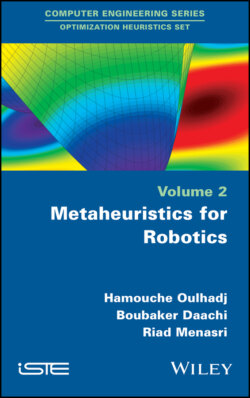Metaheuristics for Robotics

Реклама. ООО «ЛитРес», ИНН: 7719571260.
Оглавление
Hamouche Oulhadj. Metaheuristics for Robotics
Table of Contents
List of Tables
List of Illustrations
Guide
Pages
Metaheuristics for Robotics
Preface
Introduction
1. Optimization: Theoretical Foundations and Methods. 1.1. The formalization of an optimization problem
1.2. Constrained optimization methods
1.2.1. The method of Lagrange multipliers
1.2.1.1. Necessary optimality conditions
1.2.1.2. Necessary and sufficient conditions
1.2.2. Method of the quadratic penalization
1.2.3. Methods of interior penalties
1.2.4. Methods of exterior penalties
1.2.5. Augmented Lagrangian method
1.3. Classification of optimization methods
1.3.1. Deterministic methods
1.3.1.1. Heuristics
1.3.1.2. Analytical methods
1.3.2. Stochastic methods
1.3.2.1. Monte Carlo methods
1.3.2.2. Metaheuristics
1.3.2.2.1. Neighborhood search metaheuristics
1.3.2.2.2. Population-based metaheuristics
1.4. Conclusion
1.5. Bibliography
2. Metaheuristics for Robotics. 2.1. Introduction
2.2. Metaheuristics for trajectory planning problems
2.2.1. Path planning
2.2.1.1. Planning within the joint space
2.2.1.2. Planning in the Cartesian space
2.2.1.3. Hybrid planning: joint space -> Cartesian space
2.2.1.4. Hybrid planning: Cartesian space -> joint space
Particle swarm algorithm
Evolutionary algorithms
2.2.2. Trajectory generation
2.3. Metaheuristics for automatic control problems
2.4. Conclusion
2.5. Bibliography
3. Metaheuristics for Constrained and Unconstrained Trajectory Planning. 3.1. Introduction
3.2. Obstacle avoidance
3.3. Bilevel optimization problem
3.4. Formulation of the trajectory planning problem
3.4.1. Objective functions
3.4.2. Constraints
3.5. Resolution with a bigenetic algorithm
3.6. Simulation with the model of the Neuromate robot
3.6.1. Geometric model of the Neuromate robot
3.6.2. Kinematic model of the Neuromate robot
3.6.3. Simulation results
3.7. Conclusion
3.8. Bibliography
4. Metaheuristics for Trajectory Generation by Polynomial Interpolation. 4.1. Introduction
4.2. Description of the problem addressed
4.3. Formalization
4.3.1. Criteria
4.3.2. Constraints
4.4. Resolution
4.4.1. Augmented Lagrangian
4.4.2. Genetic operators
4.4.2.1. Selection operator
4.4.2.2. Crossover operator
4.4.2.3. Mutation operator
4.4.3. Solution coding
4.5. Simulation results
4.6. Conclusion
4.7. Bibliography
5. Particle Swarm Optimization for Exoskeleton Control1. 5.1. Introduction
5.2. The system and the problem under consideration. 5.2.1. Representation and model of the system under consideration
5.2.2. The problem under consideration
5.3. Proposed control algorithm
5.3.1. The standard PSO algorithm
5.3.2. Proposed control approach
5.4. Experimental results
5.5. Conclusion
5.6. Bibliography
Conclusion
Index. A, B, C
D, E, F
G, H, I
J, L, M
N, O, P
Q, R, S
T, W
WILEY END USER LICENSE AGREEMENT
Отрывок из книги
Optimization Heuristics Set
coordinated by
.....
November 2019
This book is organized into five chapters.
.....